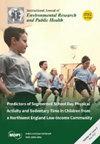Health Status and COVID-19 Epidemiology in an Inland Region of Portugal: A Retrospective Study
3区 综合性期刊
Q1 Medicine
International Journal of Environmental Research and Public Health
Pub Date : 2024-08-06
DOI:10.3390/ijerph21081033
引用次数: 0
Abstract
Multiple factors, from socioeconomic development to genetic background, can affect the regional impact of some diseases, and this has also been seen during the COVID-19 pandemic. The objective of this retrospective study was to characterize a population in the interior of Portugal regarding health status and COVID-19 epidemiology. Between October 2021 and January 2023, 1553 subjects residing in Beira Baixa, Portugal, were included. Using a self-report approach, demographic and clinical data were obtained. Blood group, blood pressure, peripheral oxygen saturation and anti-spike protein immunoglobulin concentration were also analyzed. Statistical analysis was performed using IBM SPSS Statistics. The average age of the participants was 48.95 (±14.43) years, with 64% being male and 36% being female. The most prevalent comorbidities were hypertension (19.2%), dyslipidemia (12.6%) and diabetes mellitus (6.6%). Half of the population was overweight, and more than half of the subjects had no history of tobacco consumption. Among the participants, 33% were infected with SARS-CoV-2: 70.1% had mild disease, 14.1% moderate disease and 1.4% severe disease. There was a very significant adherence to vaccination (97%). Previously infected or vaccinated people had higher anti-spike protein immunoglobulin values; this value depended on the vaccine administered (p < 0.001). Patients with autoimmune diseases and smokers had lower levels of anti-S IgG antibodies (p = 0.030 and p = 0.024, respectively). The severity of COVID-19 did not affect the concentration of anti-S IgG (p = 0.430). This study highlights the general health statuses and the impact of COVID-19 on a population in the Portuguese interior. Knowledge of the circulation and impact of the virus in this specific population can alert and assist in better interventions being conducted by health authorities.葡萄牙内陆地区的健康状况和 COVID-19 流行病学:回顾性研究
从社会经济发展到遗传背景等多种因素都会影响某些疾病的地区影响,在 COVID-19 大流行期间也出现了这种情况。这项回顾性研究旨在了解葡萄牙内陆地区人口的健康状况和 COVID-19 流行病学特征。在 2021 年 10 月至 2023 年 1 月期间,共纳入了 1553 名居住在葡萄牙贝拉白沙的受试者。通过自我报告的方式,获得了人口统计学和临床数据。此外,还对血型、血压、外周血氧饱和度和抗尖峰蛋白免疫球蛋白浓度进行了分析。统计分析使用 IBM SPSS 统计软件进行。参与者的平均年龄为 48.95 (±14.43) 岁,其中 64% 为男性,36% 为女性。最常见的合并症是高血压(19.2%)、血脂异常(12.6%)和糖尿病(6.6%)。半数人超重,超过一半的受试者没有吸烟史。参与者中有 33% 感染了 SARS-CoV-2 病毒:70.1% 患有轻度疾病,14.1% 患有中度疾病,1.4% 患有重度疾病。接种疫苗的依从性非常高(97%)。以前感染过或接种过疫苗的人抗尖峰蛋白免疫球蛋白值较高;该值取决于接种的疫苗(p < 0.001)。自身免疫性疾病患者和吸烟者的抗S IgG抗体水平较低(分别为p = 0.030和p = 0.024)。COVID-19 的严重程度并不影响抗 S IgG 的浓度(p = 0.430)。这项研究强调了 COVID-19 对葡萄牙内陆人口的总体健康状况和影响。了解该病毒在这一特定人群中的传播和影响可以提醒和帮助卫生当局采取更好的干预措施。
本文章由计算机程序翻译,如有差异,请以英文原文为准。
求助全文
约1分钟内获得全文
求助全文
来源期刊

International Journal of Environmental Research and Public Health
Medicine-Public Health, Environmental and Occupational Health
CiteScore
7.30
自引率
0.00%
发文量
14422
审稿时长
1 months
期刊介绍:
International Journal of Environmental Research and Public Health (IJERPH) (ISSN 1660-4601) is a peer-reviewed scientific journal that publishes original articles, critical reviews, research notes, and short communications in the interdisciplinary area of environmental health sciences and public health. It links several scientific disciplines including biology, biochemistry, biotechnology, cellular and molecular biology, chemistry, computer science, ecology, engineering, epidemiology, genetics, immunology, microbiology, oncology, pathology, pharmacology, and toxicology, in an integrated fashion, to address critical issues related to environmental quality and public health. Therefore, IJERPH focuses on the publication of scientific and technical information on the impacts of natural phenomena and anthropogenic factors on the quality of our environment, the interrelationships between environmental health and the quality of life, as well as the socio-cultural, political, economic, and legal considerations related to environmental stewardship and public health.
The 2018 IJERPH Outstanding Reviewer Award has been launched! This award acknowledge those who have generously dedicated their time to review manuscripts submitted to IJERPH. See full details at http://www.mdpi.com/journal/ijerph/awards.
 求助内容:
求助内容: 应助结果提醒方式:
应助结果提醒方式:


